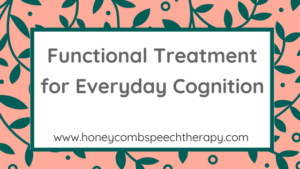Hellloooo SLP’s!
It may seem like I’ve been missing for the past few months, but never fear! Your functional-friend has been busy reading, researching, creating, and planning for an awesome new series (all while growing another human! I’m due this fall). For the next few months, I’ve focused my efforts on the cognitive side of adult speech therapy.
My new series is all about Functional Treatment for Everyday Cognition. If you have that deep-down knowledge/feeling that games and worksheets aren’t really cutting it for our neuro patients…. but aren’t sure what else to pass the time with in therapy, then this series if for you! Evidence tells us there are TONS of treatment methods we can apply to make a functional difference in our patients’ lives!
Today, we are talking about why Functional Treatment for Everyday Cognition matters. Why do a series about this?
Functional Treatment is a person-centered approach. Using a Person’s own goals to improve their performance and meaning in life tasks is the very essence of person-centered care. We know from research that person-centered care offers better patient satisfaction and outcomes. Those who are highly involved in setting personal goals have better outcomes when treatment is done (Webb & Gluecauf, 1994).
Why do we care about a person-centered approach? Person-centered care has become the standard across health settings, and therefore our speech therapy treatment and resources need to change from decades ago. As SLP’s, we are no longer telling a patient what their problem is and what we are working on. Instead, we are collaboratively identifying person-centered goals, therapy, and outcome expectations. The Worldwide Health Organization describes person-centered outcomes as focusing on the activity and participation of a patient (can they make their own coffee? Set an alarm? Use their call light?), as opposed to measuring impairment level outcomes only (sustained attention, problem-solving, memory).
Is the functional approach just another option in our treatment bag? This approach is not just “another option” because it’s fun to have options; it’s actually the best option when considering large healthcare initiatives as well as our own SLP literature. We are in a new era as SLP’s, as our own SLP literature for the adult neurogenic population has shown ample evidence that cognitive-communication therapy MUST be performed in-context if we hope to make a difference in someone’s everyday life. Research has shown that using workbooks in therapy does not generalize to everyday life skills or strategies. Playing games–either board games or nonfunctional apps– only improve someone’s skill at playing that actual game.
Does this functional / person-centered approach apply to treating cognition for adults with brain injury? Best practices indicate that for cognitive intervention to be meaningful in real-life; we MUST practice skills and strategies in a real-life context. That means that drilling a skill with a worksheet, game, or app has not been proven to make a difference when someone is using cognitive skills in real life. This includes problem-solving, attention, planning, memory, and organization (Ponsford et al., 2014). See references below; I will also be including links to evidence-reviews in future posts.
I’m not sure what I would do in treatment if I didn’t have worksheets or games. I’ve been where you are! You have “Tossed The Workbooks”, “Closed The Game Closet”, and “Scrapped the Nonfunctional Apps.” NOW WHAT? The good news is that research supports MANY treatment options and frameworks that have been shown to improve everyday activities for cognition. This is exactly why I chose to create a multi-part series for Functional Treatment for Everyday Cognition! The products I’ve created are affordable, useable, efficient, and supported with evidence. Stay tuned for the launch of the first product next week!

References
Academy of Neurologic Communication Disorders and Sciences. Evidence-based clinical research. Retrieved from: https://www.ancds.org/evidence-based-clinical-research#TBI
Ponsford, J., et al. (2014). INCOG recommendations for management of cognition following traumatic brain injury.. Journal of Head Trauma Rehabilitation, Volume 29 (4), 321-386.
Webb & Gluecauf (1994). The effects of direct involvement in goal-setting on rehabilitation outcome for people with traumatic brain injuries, Rehabilitation Psychology, 39(3): 179-188.
Fantastic! Thank you for being part of moving out field forward and upward. Look forward to what you post!!!
Thank you so much for your kind words, Denali! I know it’s a team effort to make some big changes in our field; we can do it together!